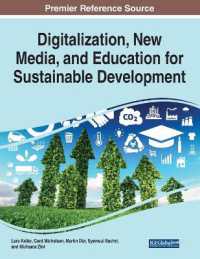- ホーム
- > 洋書
- > 英文書
- > Philosophy
Full Description
What is knowledge? Where does it come from? What kinds of knowledge are there? Can we know anything at all? What is the practical relevance of learning about epistemology?
This lucid and engaging introduction grapples with these central questions in the theory of knowledge, offering a clear, non-partisan view of the main themes of epistemology. Both traditional issues and contemporary ideas are discussed in 22 easily digestible chapters, each of which concludes with a useful summary of the main ideas discussed, study questions, annotated further reading, and a guide to internet resources.
Each chapter also features text boxes providing bite-sized summaries of key concepts and major philosophers, and clear and interesting examples are used throughout. The book concludes with an annotated guide to general introductions to epistemology, a glossary of key terms, and a summary of the main examples used in epistemology. This is an ideal first textbook in the theory of knowledge for undergraduates coming to philosophy for the first time.
This fifth edition has been revised throughout and features a new part devoted to social epistemology. In addition, the text as a whole has been refreshed to keep it up-to-date with current developments.
Contents
Preface to the fifth edition How to use this book Part 1: What is knowledge? 1. Some preliminaries 2. The value of knowledge 3. Defining knowledge 4. The structure of knowledge 5. Rationality 6. Virtues and faculties Part 2: Where does knowledge come from? 7. Perception 8. Testimony and memory 9. A priority and inference 10. The problem of induction Part 3: What kinds of knowledge are there? 11. Scientific knowledge 12. Religious knowledge 13. Moral knowledge Part 4: What are the social dynamics of knowledge? 14. Disagreement 15. Ignorance and Epistemic Injustice Part 5: How can the theory of knowledge be applied to particular domains? 16. Technology 17. Education 18. Law 19. Politics Part 6: Do we have any knowledge? 20. Scepticism about other minds 21. Radical scepticism 22. Truth and objectivity. Further Reading Glossary of Terms Index








